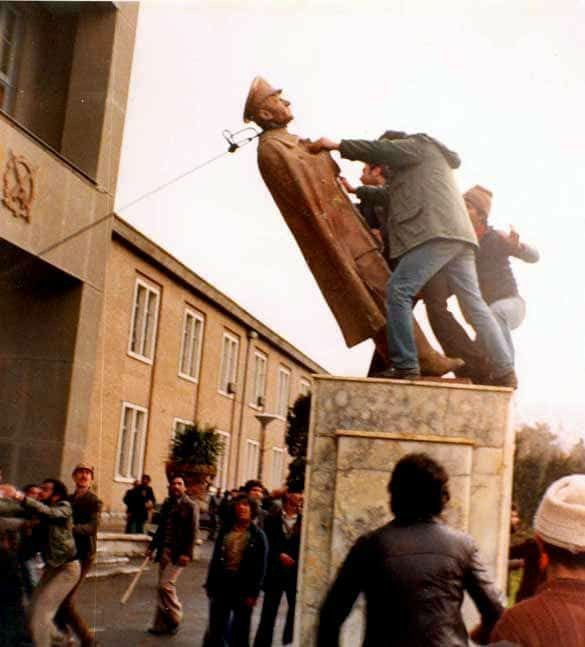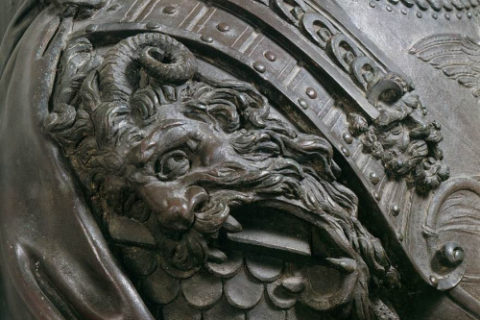In this third and final portion of the Nationalist Lessons from Iran, I cover the methods of messaging and communications that led to the creation of a successful Iranian Nationalist movement in the late 1970s. Specifically, I deconstruct the communications strategy of the Iranian Revolution’s enigmatic leader, the Grand Ayatollah Ruhollah Khomeini. Finally, I conclude with some applicable communications lessons that can be utilized by Global Nationalist movements that seek the advancement of their people in a time of unprecedented assaults against the cause of National Identity.
The study of the Iranian Revolution is important to all Nationalist movements. It is unique in that it is not simply a matter of reclaiming some form of identity after a period of National suppression, such as Ireland, or the blossoming of an entirely new National identity, such as the early United States. Rather, Iran enjoyed a Nationalist identity before its revolution in 1978/9. But, Iran did something that no other country in the history of the world had ever done before. Iran beat back corrosive modernity through a re-framing of its Nationalist identity. Revolutionary Islamo-Nationalist Iran was able to dismantle both a Marxist movement that was growing in popularity AND a secular Westernized power apparatus.
To put these extraordinary achievements into place for Western Nationalists of any stripe – especially Southern Nationalists – you will recognize a remarkably similar set of circumstances as that within which Nationalists find themselves today. Khomeini achieves a complete reversal of an order that undermined his faith and the broader Iranian people.
First, consider where Khomeini stood only a few short years before he launched his revolution. The Pahlavi Shah yielded unprecedented power. The Shah was backed by the United States, Israel, and Western oil allies. He tightly held the military and intelligence apparatus, Sāzemān-e Ettelā’āt va Amniyat-e Keshvar (SAVAK). Most scholars of the era believe that the Shah held power without question until 1977, when he was first diagnosed with cancer. The fact that the Shah was overthrown so quickly was extraordinary. Needless to say, the Islamo-Nationalist Iranian Revolutionaries were secularly suppressed by virtue of either strict internal controls or imposed exile, to include Khomeini, who was relegated to live first in Turkey, then Iraq, and finally France for the approximately fifteen years prior to the revolution.
Meanwhile, Marxism was rapidly on the rise in Iran.
At the center of the Marxist revolutionary movements within Iran was a cadre of Jewish academics who controlled a significant foothold in the Iranian press. The publication of “Tamuz,” a Marxist revolutionary newsletter, was pushed by “The Society of Jewish Intellectuals” in Tehran. Attempts to divorce socialist-secular reforms, more closely aligned to Western European economic-democratization, from Jewish-led Bolshevism in the early 1960s and throughout the 1970s were confused with anti-religious rhetoric espoused by Jewish intellectuals. The promotion of divorce, transgenderism, homosexuality, pedophilia, and women’s empowerment by The Society of Jewish Intellectuals made it nearly impossible to distinguish more moderate reforms, such as German-style socio-economic safety nets. In fact, the issue of societal confusion propagated by Judeo-Bolsheviks in Iran was so bad that it required a shocking 1967 fatwa issued by Khomeini himself, arguing that sex-change operations were a legitimate cure for homosexuality.
Meanwhile, Mossad was confused as to exactly “who” would likely emerge as the power in a post-Shah Iran – Marxists or European-style Socialists – if such a change were to occur at all. They never suspected a clerical uprising because, despite the relative size of the Jewish community in Iran (approximately 3% at the time of the Revolution), the Jewish community had a very strong grasp on the power centers of the media, academia, and extra-national finance. Mossad had its feet firmly implanted in two buckets – SAVAK and the Marxist Mujahedin-e Khalq (MEK). It was excluded from the religious parallel infrastructure that would make revolution possible. This is an important fact for Southern Nationalists to remember, which I will address later in this article.
If you are a Nationalist, put this all together. As late as 1977 – less than two years before he effectively overthrew Iran, the status of an Iranian Islamo-Nationalist movement was in a bad place: Khomeini was in exile; Jewish intellectuals controlled the mainstream media, academia, and a large segment of banking; the establishment controlled every other facet of society; anti-establishment reactionaries were arrested for taking strong, conservatives positions; the American and Israeli governments assisted in the targeting of dissidents; all forms of mass communications excluded dissenting voices to the point that, dissidents had to change their names and methods of communications to get their message out to the Iranian people – including Khomeini.
Does any of this sound familiar, Dissident Right?
Khomeini had one weapon, however, that transcended the suppressive capabilities of his enemies: his ability to communicate. Neither the Pahlavi Establishment nor the Marxists were capable of suppressing his compelling message of Shi’ite unity. Nor, for that matter, were they able to counter the messaging.
At the time of Khomeini’s exile, the Iranian clergy was co-opted by the state. It wove secular tones into religious messaging. Baqer Moin writes in his contribution to Pioneers of Islamic Revival, “Khomeini’s Search for Perfection: Theory and Reality,” that Khomeini was surrounded by Islamic leaders – many from Iran at the Shah’s expense – in Najaf whom “he did not trust.” Khomeini was right not to trust those around him. As the Shah in nearby Iran used his authority to compel religious scholars to justify his myriad of culturally corrosive reforms on one hand, the messaging itself was being driven by the Society for Jewish Intellectuals in Tehran, on the other.

Here is how Khomeini got around the power centers and intelligentsia that sought to suppress his messaging.
Keep it Simple
First, Khomeini kept his messaging simple. Contrary to both American and Israeli propaganda that depicted Ruhollah Khomeini as a religious simpleton, the Grand Ayatollah was a renowned scholar and highly intelligent. His writing and spoken style, however, was simple for easier consumption by the masses. It is described as having a “country ease” about it. Reducing highly complex subjects, like Shi’i mysticism as a unifying identitarian component of a future Iran could not have been very easy, but he managed to pull it off.
Likewise, Nationalists of all stripes rarely originate in the cities of power. The reason is intuitive. Power elites center themselves within those cities and few have a reason to question the status quo. Individuals excluded from power often derive from other parts of the country. In the U.S., that would be “flyover country” or the “red states.” In the UK, that would be the British Midlands. Even if the leadership is motivated by relative deprivation that they witnessed in the cities themselves, they often “return home” to inspire change. Communicating to the masses of “others” requires a different type of rhetorical skills.
Southern Nationalists know all too well how their enemies confuse a Southern accent with a lack of intelligence. It appears that the CIA had a similar disdain for Khomeini due to his simple language. Not only are you likely to be underestimated, those who are familiar with your similar vernacular are likely to hear your message more succinctly when it comes with a familiar drawl. Simplifying the message will only enhance the potential of your words reaching a broader audience.
Define your rival; do not discuss your rival.
Khomeini referred to “the manner in which Muslims had been wronged by Jews, Christians, imperialism, and colonialism, with the help of servile and corrupt rulers.” (Moin, P.88) Khomeini was known for having a polemical style of discourse, but he often alluded to the enemies of the Iranian people. He never laid the blame at the feet of the people themselves (e.g., “You, Iranian, are at fault because, while you were watching sports-ball, the Shah stole from your people…”). He painted a picture of oppression and pointed toward grave injustices in the power dynamic. When listening to his speeches, one does not have to hear the words “Jew” or “American” to understand that he is clearly talking about Jews and Americans. He used easily identifiable euphemisms that his audience understood and associated quickly.
This is not to say that he never called out the enemies of Islam or the Iranians. He did. Anyone who listened or read his speeches knows that Khomeini called out his enemies. But he did not just say, “the West is bad.” Khomeini explained why they were bad. Here is an example from June 1979:
“Do not think that the westerners have progressed. They have advanced materially, but they have no spirituality. Islam and other divine schools of thought seek to perfect and construct true human beings, but the West has nothing to do with this matter. The West has discovered natural resources and natural power while using them against human beings. The West uses these powers to destroy cities, countries and even humanity.”
As it pertains to Israel, he was quite clear. Again, just one example in which Khomeini does not simply say “Israel is bad,” but explains why it is bad:
“Time and again, I have pointed out that Israel considers itself extending from the Nile to the Euphrates and [views] you as usurpers of its lands, although it does not have courage yet to explicitly express this view.”
Nationalists cannot simply throw out that they have “enemies.” This makes them appear as though they are conspiracy theorists who are not worthy of careful consideration by moderate people. There needs to be a nuanced reason why the moderate person should be concerned with the enemies to your nationalist cause. You achieve this by defining the enemies for your listeners.
Modernity is the Problem; the ruling class are its peddlers for nefarious reasons.
Like most revolutionary leaders, Khomeini did not arise from nothing. A theological base of thought was building around him for years. Ali Shariati, a contemporary of Khomeini’s, was laying an argument against modernity that was compelling to the masses. In Nikki Keddie’s Modern Iran: Roots and Results of Revolution, she states that Shariati viewed “aesthetic societies (i.e., religiously and culturally void) as sad and unattractive… material satisfactions are deceptive.” Khomeini expounded upon this messaging, and it may be his most important lesson to Nationalists.
Do we really have it better than our grandparents?
By changing the very nature of the rival from one that is singularly identifiable, such as “the Jews,” to an all encompassing condemnation of society, Khomeini was able to inspire a thought within his followers that spread like a virus throughout less politically active, normie Iran – Do we really have it better than our grandparents? Quickly, as Iranian traditions crumbled through the introduction of mini-skirts, lascivious behavior, transgender surgeries, etc. – all of which was pervasive in late-1960s Iran – the average Iranian listening to Khomeini not only found himself agreeing with the messaging, but it ideologically unified him with individuals whom he would not otherwise associate.
The next step for Khomeini was laying out the evidence of the peddlers of the problem. America was pushing reforms upon Iran because it sought to control the Muslim world through its culturally corrosive whispers. The Jews were pushing Marxist rhetoric upon the next generation of Iranians in the universities and leading them to sadder lives. The Shah was letting this happen – complicit in the erosion of societal norms. In effect, Khomeini’s theme boiled down to the following: “Modernity is ruining your life. Those are the people who are peddling modernity. Reject them and listen to me.”
The Nationalist who focuses his communications on the problem and not the cause eventually finds himself with a much larger audience toward which he can eventually offer a solution.
Offer a solution that is culturally compelling and offers a binding glue
Khomeini constantly hammered home the need for God. In fact, he was so committed to the spread of Shi’ism’s relationship with God, that when he ruled, he would often reduce secular challenges to one that could be solved by faith. But the solution itself was one that spoke to the broader masses in relatable terms. It was simple and to the point. Iran lost its way when it embraced modernity; to retake everything, start with God. Faith became the binding glue of the revolutionary movement.
There was a two-fold communications strategy embedded in that simple message. First, when Nationalist competitors to Khomeini decided to address the secular structural reforms of modern Iran, Khomeini and his followers were able to point toward the complexities of the argument as simply a continuation of the same while simultaneously inferring that the competitor was an insufficient Muslim. Second, because the argument was about God, it was impossible to argue. Any argument against God was not only politically unpopular to the masses, it was blasphemous. It immediately closed off the ears of otherwise moderate potential allies to the enemies of Khomeini.
Southern Nationalists find themselves in a similar situation due to Southern society. Whereas European or American White Nationalists might be able to get away with avoiding the topic of God, the South is a bastion of Christianity. It would be impossible to get Southerners to listen to a message that began, “There is no God.” In fact, taking this a step further, Southerners would also close their ears to any group that denied the existence of Jesus Christ. Even religious White Nationalists, who agree with the importance of God, make a mistake when they focus on the root problem as anything other than the devaluation of God in modern society. Why? Because there are a lot of people who recognize there is a problem; they do not agree on the varied causes of that problem. The lack of God is a unifying, culturally accepted principle upon which all other arguments can then be made.
Reclaim the Faith
Once Khomeini identified the problem (Modernity), the causes (Americans, Jews, the Shah, etc), and the solution (God) it was important for Khomeini to use this Shi’ite Awakening to dismantle the enemies of the Iranian people who held them away from the solution. Jewish Marxists had infiltrated Shi’ite institutions through the use of Abrahamic associations. There was a pervasive belief emerging that became accepted in some of the most conservative Shi’ite mosques: the Jewish people were a Chosen People through Abraham, albeit as the seeds of Isaac and not Ishmael; their blessings were limited until they accept the message of the Prophet Muhammed.
Khomeini was able to directly assault this line of thinking. There is only one “Chosen” faith – those who embrace the message and teachings of the true Prophet – Period; end of story. Anyone who tried to peddle such nonsense – that there was another way to Allah’s Paradise – were clearly enemies of the real Chosen people, the true believers of Islam. By pointing to the very teachings of Muhammed, he not only built a scriptural argument for that which made the Iranian Shi’ites worthy of salvation, but that which made Judaism a threat to the Shi’ite people. By extension, he was then able to scripturally support an anti-Zionist posture. This turned ordinary Iranians from individuals who gave little thought to Jewish influences in Iranian society to those who began to see it everywhere.
The Shah had also dug his claws into the faith as well, and Khomeini was able to address this issue, too. Whereas Khomeini was not nearly as conservative as is often believed (for example, he supported women’s suffrage), he was still a conservative, anti-modern cleric. The Shah’s reforms had led to a disintegration of Iranian society. The secular state no longer stood for the preservation of the Iranian people and culture. It now represented homosexuality, abortion, and the surrender of its economic sovereignty to globalist forces (oil companies and bankers). It was easy for Khomeini to undermine “patriotic” churches by simply pointing to the incoherence of the clergy and the state. “The Shah is ungodly; the lack of God is our problem. Any mosque that supports the Shah does not support God and is therefore a continuation of the problem.”

Putting together a linear and coherent message
The real strength of Khomeini was his ability to walk his audience through a linear argument toward a conclusion that resulted in an Islamic oriented, Nationalist consensus. Revolution was divinely mandated. This ability enabled his message to get amplified by the thousands of dissident students – young traditionalists – who believed modernity was failing them and Khomeini offered the answer. Moin describes periods in which Khomeini, an introvert by nature with a deep interest in philosophical and mystical discourse, would go off track in his messaging (P.75). But he did so in a way that reinforced his points.
The listener or reader of Khomeini would come away with the following facts:
- Modernity is bad.
- The Jews, the Americans, the West, Global Capitalism, and the Shah (the Establishment) are all the causes of modernity.
- Modernity is an enemy of God – therefore, the peddlers of modernity are enemies of God.
- God is the solution.
As true believers, Iranian Shi’ites are uniquely loved by God and He will bless them if they reject modernity and their demonic agents, take back the country, and rebuild a Godly Nation-State.
This message discipline was simple, to the point, and powerful. Since the mechanisms of communications were controlled by the Establishment and his ideological rivals, the Jewish intelligentsia, Khomeini spread his message through young men listening to cassette tapes – the 1970s version of podcasts – and smuggled newsletters that bypassed Establishment censors.
Charles Kurzman writes in The Unthinkable Revolution in Iran, that the more the state tried to crush the dissidents, the more moderately conservative Iranians gravitated toward their cause. What began as “those religious nuts,” soon became a movement whereby ordinary, non-religious Iranians were willing to die for the right of “religious nuts” to express their opinion. When the universities went after traditionalist dissidents with a vengeance in the mid-1970s, but allowed Jewish Marxist groups to speak freely about revolution, the stark contrast in applied suppression effectively made Khomeini’s case for him.
The end result was that a revolution, which really began as a Marxist overthrow of the Shah, ended with a new Islamic Republic that reversed decades of a degenerative dive for Iranian society. Young Shi’ite revolutionaries co-opted movements by force of sheer zeal. They had no weapons. They had very little money. They had no infrastructure support. Yet they won – because of messaging.
Khomeini succeeded in his cause, largely by a commitment to constant messaging and inspiring a revolution back home.
The Message Matters
Today, Nationalist communications are disjointed. Much of the Nationalist messaging harms the cause of the movements themselves because they lack clarity. They range from legitimate accusations of foreign intrigue to “shit-posting” about black people – much of which pushes away “normie” citizens. If the Nationalist movement wants to win, it needs the normie citizen to listen to its message. While fun, ironical memes have a limited value.
Yelling “ZOG” has no value to any serious movement. Posting cartoon apes in baggy pants and bling does not win serious converts to our cause. Convincing people that you have to win is the most important goal of Nationalist communications.
For the Southern Nationalist, a cohesive message is not unlike that of the Iranian revolutionaries of the 1970s.
- Modernity is bad.
- The Establishment is the cause of modernity.
- This is who runs the Establishment: non-Christians, atheists and Yankee elites.
- Modernity is an adversary of God – therefore, the peddlers of modernity are the adversaries of God.
- God is the solution.
As true believers, the South is loved by God and He will bless them if they reject modernity, take back the land, and rebuild a Godly Nation-State.
Numbers one, two, four, and five are easy to sell to the South. Number three is the trick. It requires a dismantling of Dispensationalist theology. Convincing ordinary Southern Christians that non-Southerners, atheists, and non-Christians stand against their culture requires finesse, but it can be done. One aspect in particular must be prohibited: bludgeoning them with distasteful “Holohoax” memes, this will not work. Rather, that element requires a careful articulation of Scripture. In fact, I believe that many of the underpinnings of revolutionary sympathies are manifesting in a South that is constantly under attack. It simply needs to know “who” and “why” it is under attack.
That requires messaging that hammers home every facet of a return to a Godly Southern society and points out the rivals of that Godliness. One need not put parentheses around the names of deleterious, globalist authors. Simply point them out. Explain why that which they are peddling is good for their people, but bad for the average Southerner. Everything that is communicated by the Southern Nationalist should boil down to the following line:
“This modern world is not working. Our people are not better off. We need to change before it is too late. The South needs God more than ever. If we embrace God, He will embrace us. Anyone who stops us from embracing God is against the Southern people. It is time to depart from their negative influences to embrace a powerful future for our Southern children.”
Southern Nationalism is a divinely inspired cause upon which your forefathers once gave their very lives in great numbers. If you look inside yourself, you will see the genetic link to men who ran across a battlefield to be free. You have no right to surrender the cause of Southern Freedom for the sake of lascivious modernity. God has a divine purpose for the South. Submit to His Will and Win a Free South.
This concludes this section of the Nationalist Lessons Series. Thank you for reading this and the works of my fellow Southern Patriots throughout Identity Dixie. Now is the time to put plans into action.
Deo Vindice
The son of a recent Irish immigrant and another with roots to Virginia since 1670. I love both my Irish and Southern Nations with a passion. Florida will always be my country. Dissident support here: Padraig Martin is Dixie on the Rocks (buymeacoffee.com)






Someone has calculated that there are about 30,000 Protestant denominations, each of which claims to have the correct reading of the Bible, and all of which are incompatible with one another. And therein lies the problem for any Scripture-based argument against Modernity. Most mainline Protestant churches, like the Episcopalians use Scripture to justify Modernity. Perhaps you were thinking of the Southern Baptists, but even they are adrift, at least some of them. And the Catholic Church is dead since Vatican II.
I do not know the answer, but I think a Scripture-based revolution is no longer possible.
Hello Bob –
I respectfully disagree. A scripture based revolution can occur if we embrace consistent themes that support the establishment of a godly Nation-State without getting into the details of theological disagreement. A Calvinist, a Traditional Catholic, and a Fundamental Independent Baptist can all disagree on matters of worship, but then can all agree that homosexuality, transgenderism, and abortion are bad and as such, deprive that Nation-State of blessings by God. That should be the focus.
Thank you for reading the pieces.
Respectfully,
Padraig Martin
Thank you for writing the Nationalist Lessons Series. Printed out in full it’s a well-researched instruction manual for any serious nationalist movement.
Thank you for this generous and humbling compliment, Rex.
Deo Vindice!
Padraig Martin